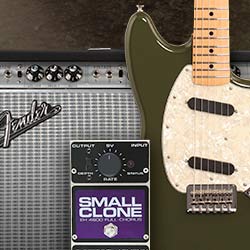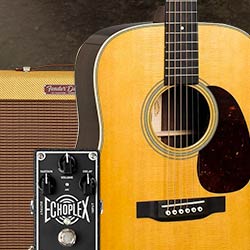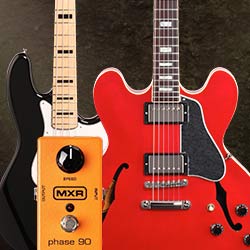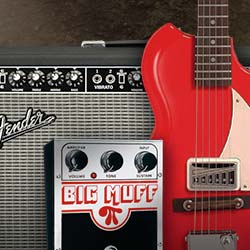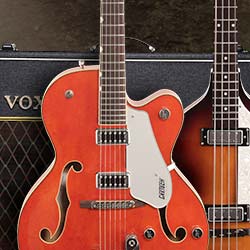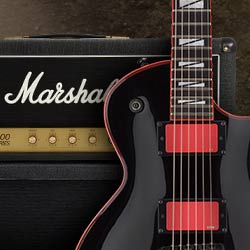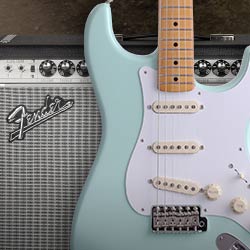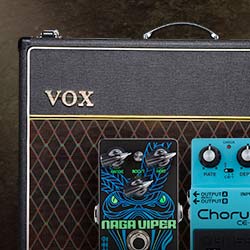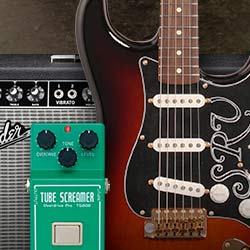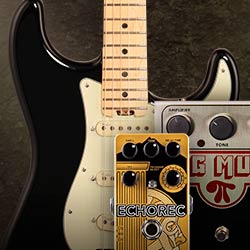Customer Kudos
"zZounds has super fast delivery, and makes buying super easy with their flexible monthly payment plans...zZounds puts instruments in reach for many people who would otherwise have to spend a year or two saving up for a guitar. Many are grateful for this business model because they can be learning and playing while they’re paying."
February 11, 2024

zZounds' Legends of Tone
Legendary tone is within your reach.
Achieving a sound that's recognizable after only hearing a few notes is no easy feat. In pursuit of that elusive tone, guitarists may spend years honing their craft and shrewdly choosing the right gear. Becoming a legend, however, means pushing your playing ability to the limit, as well as coaxing out the maximum capabilities of your gear like a rock 'n' roll snake charmer. Listen to the opening lines to "Pride and Joy," and you'll instantly recognize the throaty, aggressive tone that Stevie Ray Vaughan was known for. The same familiarity goes for the honky fuzz of a Big Muff that Jack White can't seem to get away from, the reverb-drenched spanky Strat tone of Dick Dale's surf music, or the chorused cleans and tight crunch of Alex Lifeson's game-changing prog riffs. (Insert your favorite guitarist here.)
These are the tones that have shaped the foundations of rock for decades, only to be improved upon and tweaked by subsequent generations of players. Join zZounds as we explore the fundamentals of these classic sounds in our Legends of Tone series.
Find more legendary tones in our Iconic Rigs series »
These are the tones that have shaped the foundations of rock for decades, only to be improved upon and tweaked by subsequent generations of players. Join zZounds as we explore the fundamentals of these classic sounds in our Legends of Tone series.
Nirvana
Fusing the heaviness of hard rock and metal with the ethos of punk rock, Nirvana changed the sound of rock 'n' roll in the early '90s. The band's big distorted electric guitar riffs -- sometimes washed in a sea of warbly chorus, pounding basslines, and hard-hitting drums -- provided the blueprint for the alternative rock movement that dominated the decade...and beyond. Powered by Fender guitars and some choice effects, Kurt Cobain's songwriting seemed to become more genuine when backed up by the band's sonically mangled sound.
Neil Young
Neil Young is the king of real, raw guitar tone, whether he's tracking an intimate, impromptu record with just a D-28 and harmonica, or dishing out unbridled riffs through a pile of amps onstage with Crazy Horse. Famous for his vintage, custom and often off-the-wall gear, Neil Young can be an intimidating artist to replicate. Nevertheless, we looked to some modern gear to recreate the tones from some of our favorite Neil Young songs.
Check out this edition of Legends of Tone to see how we dialed in Neil Young's distinct sound with modern, readily available guitars, amps and pedals.
Check out this edition of Legends of Tone to see how we dialed in Neil Young's distinct sound with modern, readily available guitars, amps and pedals.
Rush
Combining equal helpings of progressive rock opulence and hard rock's raw power, Rush has established themselves as a band that sounds like no other. Featuring the chorused riffs and virtuosic leads of Alex Lifeson, the grinding yet melodic bass lines and howling voice of Geddy Lee, and the explosive technical prowess of Neil Peart on drums, the band's powerhouse musicianship has always set them apart from other rock bands.
Join us as we take a closer look at Rush's signature sound, filling you in on how to nail the tone yourself -- without dropping a significant chunk of change on all the vintage gear the band has accumulated throughout the decades.
Join us as we take a closer look at Rush's signature sound, filling you in on how to nail the tone yourself -- without dropping a significant chunk of change on all the vintage gear the band has accumulated throughout the decades.
Jack White
Since his musical beginnings in 1990s Detroit, cutting his teeth as a drummer for various local bands, Jack White has made quite a name for himself. Whether you know him for his work with The White Stripes, his groups The Raconteurs and The Dead Weather, or his successful solo career, the sound of Jack White's fuzzy, octave-laden guitar tone is unmistakable.
While Jack is known for using a pretty staggering range of gear, including plenty of custom and vintage pieces, we were able to hone in on some gear picks that we think truly encapsulate his trend-setting sound. Check out this edition of Legends of Tone to see how you can dial in Jack White's unique tone with modern, readily available gear.
While Jack is known for using a pretty staggering range of gear, including plenty of custom and vintage pieces, we were able to hone in on some gear picks that we think truly encapsulate his trend-setting sound. Check out this edition of Legends of Tone to see how you can dial in Jack White's unique tone with modern, readily available gear.
A Tribute to Sgt. Pepper's
As far as influential albums go, none receive nearly as much praise as The Beatles' iconic 1967 full length, Sgt. Pepper's Lonely Hearts Club Band. Packed from beginning to end with inventive arrangements, varied instrumentation, distinctive tones, and undeniable pop hooks, this classic album quickly established itself as a pillar of pop culture.
In tribute to an album that tops many lists of the greatest ever made, we tasked ourselves with attempting to recreate some of Sgt. Pepper's beloved tones with gear you can pick up today. Using traditional instruments like guitars and basses, as well as more cutting-edge technology like Native Instruments' Komplete Ultimate software, nearly anyone can dial in the sweet, vintage tones of Sgt. Pepper's!
In tribute to an album that tops many lists of the greatest ever made, we tasked ourselves with attempting to recreate some of Sgt. Pepper's beloved tones with gear you can pick up today. Using traditional instruments like guitars and basses, as well as more cutting-edge technology like Native Instruments' Komplete Ultimate software, nearly anyone can dial in the sweet, vintage tones of Sgt. Pepper's!
Slayer
Since their formation in early '80s Los Angeles by guitarist Kerry King and drummer Dave Lombardo, Slayer has thrashed their way to the absolute top of the metal ranks, alongside bands like Metallica, Megadeth and Anthrax. The hard-hitting, high-gain riff assaults put forth by Kerry King, the late Jeff Hanneman and now Gary Holt are regarded as some of the most influential in metal. Known for their use of cranked Marshall JCM800 heads and walls of 4x12 cabinets, King and Hanneman created crushing tone to heighten the intensity of Slayer's all-out attack on listeners' eardrums.
In this edition of Legends of Tone, we've rounded up our picks for modern, accessible gear that harnesses the brutal tone of Slayer.
In this edition of Legends of Tone, we've rounded up our picks for modern, accessible gear that harnesses the brutal tone of Slayer.
Dick Dale
When dissecting the soul and history of metal, hard rock, and even some indie rock, Dick Dale is a name that should pop up sooner rather than later. The heavy-handed staccato picking Dale made famous is now a staple in modern metal, while his reverb-soaked riffs would feel right at home in a sun-baked indie rock band. Powered by his trusty Fender Stratocaster and robust Fender amps cranked within an inch of their lives, Dick Dale's legacy is one of muscular tone, beats you can dance to, and an affinity toward monster hooks.
Whether you prefer classic amp reverb tanks, or are willing to experiment with pedals, the massive wash of big 'verb is within anyone's grasp. Check out our gear picks and dial in the tone of Dick Dale!
Whether you prefer classic amp reverb tanks, or are willing to experiment with pedals, the massive wash of big 'verb is within anyone's grasp. Check out our gear picks and dial in the tone of Dick Dale!
Brian May
You don't have to be an astrophysicist to discover the unique tone that made Brian May's work with Queen so iconic. While the legendary guitarist put a career in astrophysics aside to pursue performing in Queen full-time, there's a scientific, other-worldly element to his trend-setting guitar tone. His use of Vox AC30 amplifiers and effects like the Dallas Rangemaster and multiple, competing delays gave Queen's tone a spacey, theatrical quality, while staying true to the essence of rock 'n' roll.
Check out our picks we've gathered for modern, accessible gear that channels May's groundbreaking sound -- and is sure to make your rockin' world go round.
Check out our picks we've gathered for modern, accessible gear that channels May's groundbreaking sound -- and is sure to make your rockin' world go round.
Stevie Ray Vaughan
What can be said of Stevie Ray Vaughan that hasn't been mentioned before? Incredible player, killer taste in gear, and gone too soon -- check, check, and check. While SRV's legacy as a guitarist may be one of the most written/talked about in the last 40 years, it's easy to overlook how he achieved all that praise: he was actually that good. Steeped in Texas blues down to his very soul, SRV was known to play hard, and play loud. Legend has it that he would play so hard that his calluses would fall off and he'd have to glue them back on just to keep going.
While we aren't asking you to dedicate yourself to those same practices, approximating the tone of SRV is all about setting yourself up with a solid foundation. Picking up a high-quality Fender Stratocaster and a Fender combo amp will get you close right off the bat.
While we aren't asking you to dedicate yourself to those same practices, approximating the tone of SRV is all about setting yourself up with a solid foundation. Picking up a high-quality Fender Stratocaster and a Fender combo amp will get you close right off the bat.
David Gilmour
Upon joining Pink Floyd in 1967, David Gilmour may not have thought he'd create a sound that would help guide generations of budding musicians along their path to psychedelia. Equipped with his trademark Stratocaster and a legion of effects, Gilmour sent Pink Floyd's sound into the stratosphere with soaring solos and a wealth of sustain. Known for his tasteful placement and ratio of heavy riffs to blues-influenced, expressive solos, David Gilmour has earned his place among history's great guitarists.
You may not need the "0001 Strat" or an original Dallas Arbiter fuzz to channel the ethereal tones of David Gilmour. Read on to learn about a few key pieces of gear that will help you along your way to building a wall of tone -- brick by brick.
You may not need the "0001 Strat" or an original Dallas Arbiter fuzz to channel the ethereal tones of David Gilmour. Read on to learn about a few key pieces of gear that will help you along your way to building a wall of tone -- brick by brick.
